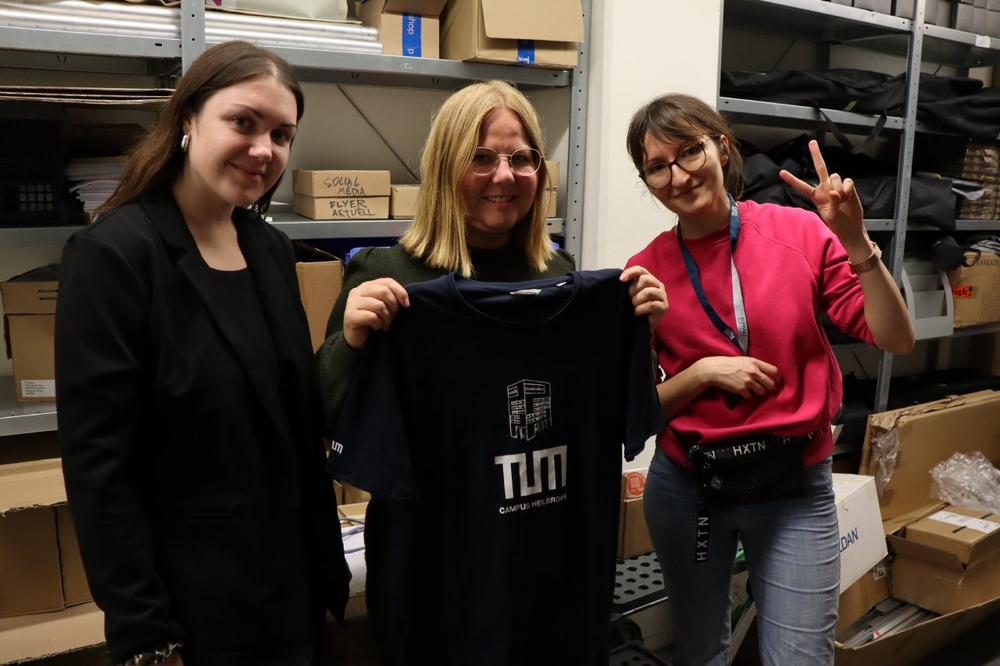The Therapeutikum Heilbronn and the TUM Campus Heilbronn also took part in the campaign: While the two rehabilitants of the Therapeutikum, Bettina Willet and Silke Ruttinger, were able to experience the campus for a day, Katja Kastrati, Referent to the Managament Board at “Die TUM Campus Heilbronn gGmbH”, visited the Therapeutikum, got to know the workshops for people with physical or mental disabilities and lent a hand at the workbench.
“Today you have the opportunity to try out these jobs and you will discover a great variety,” said Christiane Paroch, head of work and technology at the Therapeutikum, at the start of the Day of Action, addressing the eleven company representatives who are helping out in the workshops. She reports on the great excitement and anticipation of the 20 rehabilitants who are getting a taste of regional companies, authorities and institutions at the same time. The Shift Change is a “huge win” for both sides: “The rehabilitants experience the reality of the economy. This may encourage them to do an internship in the future.” Conversely, the Day of Action anchors the social idea even more strongly in the companies: “Inclusion only thrives through participation.”
Informative tour
During the subsequent tour, Dietmar Gulden, group leader at the Therapeutikum’s training center, first takes Katja Kastrati through the office service and media design departments. There, employees learn how to use computer programs and receive support in creating their application documents. They take care of incoming and outgoing mail and even publish their own magazine: “Wahnsinnswelt”.
After that, it’s off to the industrial assembly and metalworking shop. This serves as the first port of call for the rehabilitation candidates, where their individual strengths and training needs are initially determined. In a one-year basic and advanced course, they then acquire basic knowledge of wood and metalworking as well as occupational safety and complete several internal and external internships.
Getting stuck in
Katja Kastrati is soon given the opportunity to get involved in practical work: she is allowed to make small wooden objects under the supervision of Dietmar Gulden. She soon finds herself busily measuring and drilling together with Anja Rogé-Kühner from ASB Heilbronn, repeatedly discussing the correct approach with her “fellow trainee”. Gulden offers a number of helpful tips: “It’s important to always drill vertically, not at an angle,” he says, and recommends going about it a little slower than too quickly. ‘You can almost always still salvage something if you make a mistake,’ he encourages his two interns. He pays particular attention to safety at work: ”When you’re drilling, you should wear safety goggles and tie your hair back.”
In the afternoon, Kastrati gets the opportunity to take a look at the automotive department, the industrial assembly and metalworking. At the end of the day, she proudly holds a tangible result in her hands: a self-made tablet and book holder. But the insights she gained into the therapeutic center are even more valuable: “The group leaders showed tremendous appreciation for all the rehabilitation patients. They, in turn, were very open, integrated us into their work and explained a lot to us,” she says enthusiastically. She was particularly impressed by how knowledgeable the rehabilitation patients are in their respective fields of work and how many industrial companies in the region depend on the products they manufacture. She found the change of perspective during the Shift Change very refreshing and has one main wish for the next action day: “I hope that the campaign will attract even more attention and that even more companies will take part.”
Satisfied conclusion
Meanwhile, rehabilitants Bettina Willet and Silke Ruttinger are getting to know the various departments of TUM Campus Heilbronn gGmbH. They are helping to create PowerPoint presentations and press kits for the upcoming Global Technology Forum and are supporting preparations for Welcome Day. In between, there is a joint lunch in the cafeteria and a tour of the Bildungscampus Heilbronn.
Finally, Bettina Willet visits the marketing department’s warehouse: There she is given the task of counting the remaining stock of merchandise items used for the Welcome Day and restocking them for upcoming events – a task that the dedicated and reliable woman successfully completes. And so, at the end of an eventful day, Willet draws a satisfied conclusion: “It was very interesting for me. I particularly liked getting a taste of the many different departments and getting to know the Bildungscampus during the tour.” She adds: “It’s very motivating to experience a different company from the inside and meet a variety of people in the process.”
Die Technische Universität München am Campus Heilbronn ist seit dem Wintersemester 2018/19 am Bildungscampus der Dieter Schwarz Stiftung präsent. Schwerpunkte der Programme liegen auf dem Management des digitalen Wandels sowie auf Familienunternehmen. Forschung und Lehre zielen auf einen Brückenschlag zwischen Wirtschaftswissenschaften, Ingenieurswissenschaften und Information Technologies in einem dynamischen, internationalen Umfeld. So entstehen moderne Forschungsfelder, etwa mit Bezug zu Digitaler Transformation und Plattformökonomie, die in den innovativen Unternehmen der Region Heilbronn-Franken, aber auch weltweit Verwendung finden. Die durchgängig englischsprachigen Bachelor- und Master-Studiengänge bereiten auf eine Karriere in technologie-getriebenen Unternehmen vor. Eine intensive Betreuung durch Professor:innen mit internationalem Renommee und kleine, internationale Lerngruppen, machen das Studium am TUM-Campus Heilbronn zu etwas Besonderem.
Die TUM Campus Heilbronn gGmbH
Bildungscampus 2
74076 Heilbronn
Telefon: +49 (0) 7131 264180
Telefax: +49 (7131) 645636-27
https://www.chn.tum.de/de
Telefon: +49 (7131) 26418-501
E-Mail: Kerstin.Besemer@tumheilbronn-ggmbh.de
![]()
